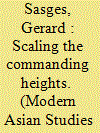| Srl | Item |
| 1 |
ID:
140940


|
|
|
|
|
| Summary/Abstract |
By the late 1800s the colonial state's increasing capacity to regulate, finance, and tax had begun to open up new opportunities for locally based French enterprises in Indochina. Chinese syndicates that had previously dominated the economy found themselves deprived of existing revenue streams and denied access to new ones. The result was an ‘Indochinese moment’ when a handful of colonial conglomerates used profits from state contracts, monopolies, and subsidies as a base for growth and diversification after 1900. Yet scaling the commanding heights of the economy was not easy, and was only achieved thanks to sustained and powerful state intervention. Moreover, one of the effects of the economic crisis after 1928 was the end of this Indochinese moment and a shift in initiative to a new partnership that linked an increasingly technocratic state with the financiers and experts of the Bank of Indochina. This article investigates this complex interaction of state power, technology, and capital flows with local Chinese, French, and indigenous Indochinese actors, using one particular conglomerate, the Fontaine group, as a case study to shed light on the mechanisms that linked an interventionist state to capitalist enterprise and ultimately to the remaking of the Indochinese economy.
|
|
|
|
|
|
|
|
|
|
|
|
|
|
|
|
| 2 |
ID:
170978


|
|
|
|
|
| Summary/Abstract |
Since China's economic reform began in 1978, millions of migrant workers have moved from inland provinces to coastal cities in search of work. This had led to an abundance of cheap labor and a prevalence of despotic management styles in the private sector since the 1980s. This scenario changed significantly from the 2000s with the proliferation of workers' strikes and the efforts of the party-state to regulate workplace relations. Against this backdrop, scholars have debated about the extent to which labor relations in China have changed, and where they may be heading. As a contribution to this debate, this special issue brings together six articles with strong empirical evidence to unpack the complexity and dynamics of workers' struggles and organizations in South China in the context of a changing political economy. Going beyond the polarization of an optimistic vision on labor movements, and a pessimistic view that emphasizes state power, we pay equal attention to the power of state institutions and workers' agency in shaping labor relations during the past four decades.
|
|
|
|
|
|
|
|
|
|
|
|
|
|
|
|